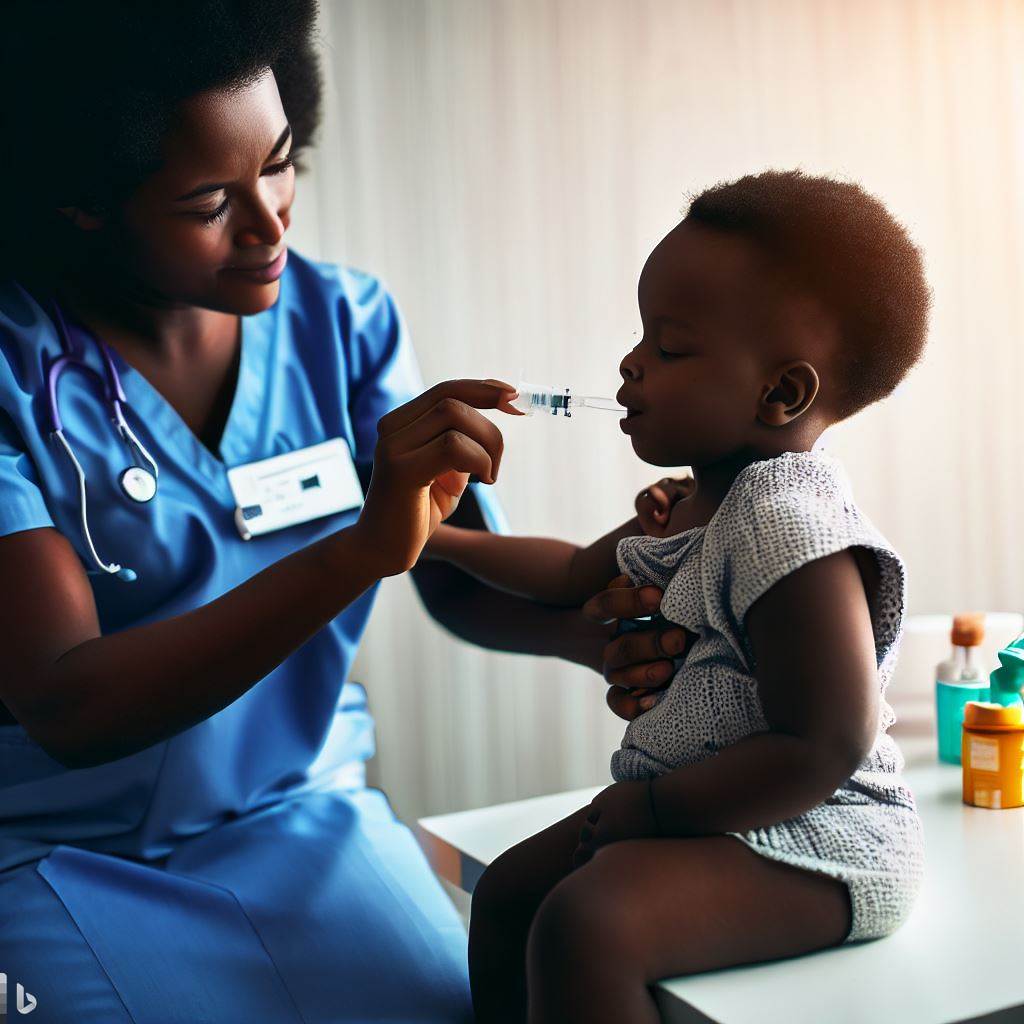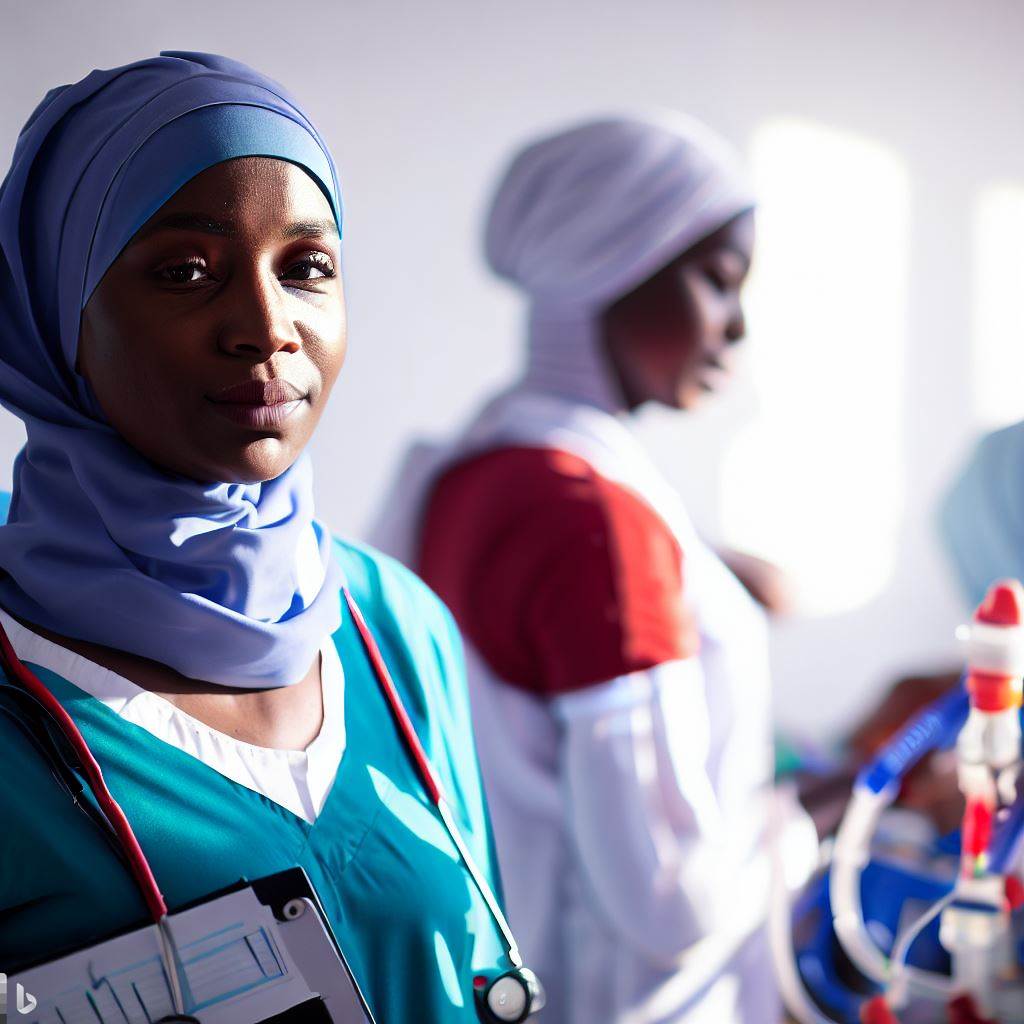Introduction
Pediatric healthcare refers to medical services focused on children’s well-being and development.
Comparing Nigeria’s pediatric healthcare globally is vital to identify strengths and areas for improvement.
- Nigeria’s healthcare challenges.
- Global comparison offers insights.
- Identify best practices.
- Improve healthcare policies.
- Enhance medical infrastructure.
- Address child mortality rates.
- Foster international collaboration.
- Implement effective interventions.
- Evaluate immunization programs.
- Enhance pediatric medical research.
In review, examining Nigeria’s pediatric healthcare on a global scale aids in fostering improvements, saving lives, and ensuring a brighter future for children in the nation.
Overview of Pediatric Healthcare in Nigeria
Key challenges
- Lack of access to quality healthcare
- Insufficient healthcare infrastructure
- Inadequate funding and healthcare budget
Impact on children’s health and well-being
In Nigeria, children face dire healthcare challenges due to limited access to quality care, leading to preventable diseases and high mortality rates.
Insufficient healthcare infrastructure, scarce facilities, especially in rural areas. Inadequate funding worsens matters, government allocation insufficient for the growing population’s needs.
Impact on kids is profound; susceptibility to illnesses like malaria and pneumonia increases.
Inadequate care hampers physical and mental growth, affecting future prospects. Pediatric healthcare in Nigeria is plagued by limited access, infrastructure, and funding.
Children’s health and development suffer; mortality rates rise, prospects dwindle.
Resolving these requires united efforts from government, healthcare professionals, and global community to ensure comprehensive child medical care.
Read: Challenges and Opportunities for Physical Therapists in Nigeria
Comparison of Nigeria’s Pediatric Healthcare with Global Standards
Maternal and child mortality rates
Nigeria has one of the highest maternal and child mortality rates globally. Lack of access to quality healthcare facilities and skilled healthcare professionals contribute to these rates.
Vaccination rates and coverage
Nigeria lags behind in terms of achieving high vaccination rates and coverage for children. Insufficient infrastructure, lack of awareness, and vaccine hesitancy are some of the contributing factors.
Healthcare services and facilities availability
Nigeria faces significant challenges in providing adequate healthcare services and facilities for pediatric care. Rural areas suffer the most due to limited access to healthcare centers and lack of proper equipment.
Nutrition and malnutrition indicators
Malnutrition among children is a severe concern in Nigeria, leading to high mortality rates. Limited access to nutritious food, clean water, and proper sanitation contribute to this issue.
Child immunization programs and coverage
Nigeria struggles to achieve high coverage in its child immunization programs. Lack of awareness, misconceptions, and vaccine hesitancy hinder the success of these programs.
Comparison to Global Standards
Nigeria’s pediatric healthcare lags globally. Challenges include high maternal and child mortality rates due to limited access to quality care.
Low vaccination rates result from inadequate infrastructure, awareness gaps, and vaccine hesitancy. Healthcare facilities scarcity, especially in rural areas, compromises pediatric care.
Malnutrition thrives due to scarce nutritious food, water, and sanitation. Government must invest in healthcare centers nationwide.
Public awareness campaigns can dispel vaccine misconceptions and boost immunization. Initiatives targeting nutrition, education, and sanitation are vital.
Collaborations among government, international bodies, and communities can implement effective strategies. Urgent action is needed to elevate Nigeria’s pediatric healthcare to global standards.
Read: Public Health Impact of Respiratory Therapists in Nigeria
Factors Contributing to Nigeria’s Pediatric Healthcare Status
Adequate pediatric healthcare is crucial for the well-being and development of children.
However, Nigeria faces several challenges that hinder the provision of high-quality healthcare to its pediatric population.
These factors shape the current state of pediatric healthcare in Nigeria:
Socioeconomic factors
- Poverty levels contribute to limited access to healthcare facilities and services.
- Lack of financial resources prevents families from seeking appropriate medical care for their children.
- Inadequate nutrition and poor living conditions negatively impact children’s overall health.
Political and government policies
- Inconsistent and ineffective healthcare policies hinder the development of a robust pediatric healthcare system.
- Inadequate funding for healthcare undermines the capacity to provide adequate pediatric services.
- Limited government commitment to healthcare infrastructure leads to inadequate facilities and resources.
Culture and traditional beliefs
- Traditional beliefs often influence healthcare-seeking behaviors, leading to delays in seeking appropriate treatment.
- Misconceptions about Western medicine may lead to preferences for traditional or alternative remedies.
- Cultural norms may discourage discussions about sexual and reproductive health, affecting adolescent healthcare.
Limited healthcare resources and manpower
- Inadequate healthcare facilities are unable to cope with the high demand for pediatric services.
- A shortage of qualified healthcare professionals, particularly pediatricians and nurses, hampers the delivery of quality care.
- Limited medical equipment and medications further restrict healthcare providers in delivering appropriate treatments.
Insufficient public health education and awareness
- Lack of awareness about preventive measures and early interventions leads to delayed healthcare seeking.
- Poor health literacy among caregivers prevents them from making informed decisions about their child’s health.
- Inadequate public health campaigns limit the dissemination of vital information on pediatric healthcare.
Addressing these key factors is essential to improve Nigeria’s pediatric healthcare status and ensure the well-being of its children.
By tackling these contributing factors and implementing targeted interventions, Nigeria can make significant strides in improving pediatric healthcare and securing a healthier future for its children.
Read: Overview: Physical Therapist Profession in Nigeria

Efforts towards Improving Pediatric Healthcare in Nigeria
National healthcare policies and initiatives
Nigeria has implemented various national healthcare policies and initiatives to improve pediatric healthcare. These include:
- Introduction of the National Health Act in 2014, which aims to enhance access to healthcare services for all Nigerians.
- Establishment of the National Primary Health Care Development Agency (NPHCDA) in 1992 to provide accessible and affordable healthcare to children.
- Implementation of the Integrated Maternal, Newborn, and Child Health (IMNCH) strategy to address the specific healthcare needs of women and children.
Collaborative efforts with international organizations
Nigeria has collaborated with international organizations to improve pediatric healthcare in the country. Some of these efforts include:
- Partnerships with organizations like UNICEF and WHO to provide technical support, funding, and expertise for child health programs.
- Joint initiatives with international organizations to improve vaccination coverage and prevent diseases such as polio and measles.
Medical research and innovation
Medical research and innovation play a crucial role in improving pediatric healthcare in Nigeria. Some notable efforts include:
- Research studies conducted to understand the prevalence and causes of common childhood diseases in Nigeria.
- Development of locally appropriate treatment protocols and guidelines for pediatric healthcare.
- Introduction of innovative technologies and interventions to enhance healthcare delivery for children.
Empowering local healthcare workers and professionals
Empowering local healthcare workers and professionals is essential for improving pediatric healthcare in Nigeria. This is being done through:
- Training and capacity building programs for healthcare workers to enhance their knowledge and skills in pediatric care.
- Providing scholarships and educational opportunities for healthcare professionals to specialize in pediatric medicine.
- Encouraging local healthcare professionals to actively participate in research and policymaking processes.
Community-based healthcare programs and interventions
Community-based healthcare programs and interventions are vital for reaching children in remote and underserved areas. These include:
- Mobile clinics and outreach programs to provide healthcare services directly to communities.
- Health education campaigns to raise awareness about child health issues and promote preventive measures.
- Partnerships with community organizations and traditional leaders to encourage community involvement in healthcare initiatives.
Read: How to Become a Diagnostic Medical Sonographer in Nigeria
Success Stories and Positive Developments
Examples of improvements in pediatric healthcare
- Nigeria has seen an increase in immunization coverage, protecting children against preventable diseases.
- The establishment of specialized pediatric hospitals has improved access to quality healthcare services.
- Medical advancements have contributed to better diagnoses and treatment options for pediatric illnesses.
- Increased funding from both the government and international organizations has helped strengthen healthcare infrastructure.
- Implementation of community-based programs has improved healthcare awareness and disease prevention.
Impact of successful interventions and initiatives
- Successful interventions, such as vaccination campaigns, have decreased child mortality rates in Nigeria.
- Improvement in healthcare services has led to a decline in cases of malnutrition and other preventable diseases.
- Early detection and treatment of childhood illnesses have increased the chances of recovery and improved overall health.
- Access to specialized care has reduced the burden on general healthcare facilities and improved patient outcomes.
- The success of healthcare initiatives has increased trust and confidence in the healthcare system among parents.
Transformation of healthcare outcomes for children
- Children in Nigeria now have better access to essential healthcare services, resulting in improved overall well-being.
- Significant reduction in child mortality rates has provided hope and a brighter future for children and their families.
- The availability of specialized healthcare facilities has allowed for timely and effective treatment of pediatric conditions.
- Improved health outcomes have positively impacted the educational and socio-economic prospects of Nigerian children.
- Investments in pediatric healthcare have contributed to building a healthier and stronger next generation in Nigeria.
Nigeria’s strides in pediatric healthcare reveal progress
Enhanced immunization, specialized hospitals, impactful interventions, and better outcomes. Child mortality drops, diseases decline, lives saved.
Vaccination campaigns, interventions, and specialized care lead to numerous lives saved, improved child health, and survival.
Access to specialized hospitals and advanced treatments boosts survival for complex cases, improves quality of life.
Healthier children from healthcare progress lead to better school attendance, academics, mental well-being, and socio-economic growth.
Collaborative work involving government, healthcare pros, global groups, local communities drives successes in pediatric healthcare.
Continued investment in healthcare infrastructure, evidence-based actions vital for maintaining, enhancing progress in Nigeria’s pediatric healthcare.
Nigeria’s achievements inspire, propel further enhancements; dedication and innovation promise brighter healthcare outcomes for children.
Together, we shape a healthier future for Nigeria’s most vulnerable – its young generation.
Read: Overview: Physical Therapist Profession in Nigeria
Future Outlook and Recommendations
Addressing healthcare funding challenges
- Implement policies to increase healthcare budget allocation and ensure proper utilization of funds.
- Explore public-private partnerships and seek external funding sources to augment healthcare funding.
- Improve transparency and accountability in the management of healthcare finances.
Strengthening healthcare infrastructure and resources
- Invest in the construction and renovation of healthcare facilities and hospitals.
- Upgrade medical equipment and technologies to enhance diagnostic and treatment capabilities.
- Expand access to essential medicines and vaccines across Nigeria.
Enhancing public health education and awareness
- Develop comprehensive public health campaigns to educate the population on preventive healthcare practices.
- Promote regular screenings and check-ups to detect diseases at an early stage.
- Empower communities with knowledge on nutrition, hygiene, and healthy lifestyle choices.
Strengthening government policies and regulations
- Implement and enforce robust regulations to ensure quality control in healthcare service delivery.
- Commit to regular monitoring and evaluation of healthcare programs for efficacy and efficiency.
- Introduce policies that prioritize the recruitment and retention of skilled healthcare professionals.
Collaboration between healthcare stakeholders and communities
- Promote partnerships between healthcare providers, non-governmental organizations, and community
leaders. - Engage communities in the decision-making process to ensure culturally sensitive healthcare practices.
- Establish community health centers to improve healthcare access in remote and underserved areas.
The future of pediatric healthcare in Nigeria can greatly improve by addressing funding challenges through adequate allocation, transparent management, and effective utilization.
Enhanced infrastructure, medical resources, and access to medicines contribute to better care.
Public health education and awareness campaigns empower communities for preventive measures. Stronger government policies and monitoring ensure quality services.
Prioritizing skilled healthcare recruitment and retention enhances the system. Collaboration between stakeholders and communities drives sustainable progress.
Partnerships among providers, NGOs, and leaders address specific needs. Establishing remote community health centers ensures universal access.
These steps elevate Nigeria’s global pediatric healthcare standing, securing a better future for all children.
Read: Step-by-step Guide to Becoming a Nursing Assistant in Nigeria
Conclusion
This section discussed the status of pediatric healthcare in Nigeria compared to global standards.
It highlighted the importance of continuous efforts to improve pediatric healthcare in the country.
It emphasized the need for healthcare stakeholders, policymakers, and citizens to take action and contribute towards enhancing pediatric healthcare in Nigeria.
In a nutshell, Nigeria has made progress in pediatric healthcare, but there are still significant challenges that need to be addressed.
By focusing on improving infrastructure, increasing funding, and implementing effective policies, Nigeria can ensure better healthcare outcomes for its children.
It is essential for all stakeholders to work together to create a healthier future for Nigerian children.




